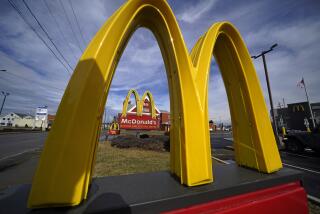Tainted Beef Fears Bump Burgers Off School Menus
- Share via
Pizza, chicken and other substitutes will be replacing hamburgers on some school lunch menus in California and other states because of fears that ground beef supplied under the U.S. Department of Agriculture’s Donated Food Program may be contaminated with a cancer-causing pesticide.
Officials stressed that there have been no reports of illness caused by meat tainted with heptachlor, a pesticide used widely on feed grains until it was banned as a carcinogen in 1978. Samples of school lunch beef from the five meatpackers who may have processed tainted beef have yet to show heptachlor contamination.
But USDA officials said Wednesday that they had issued a “precautionary hold” on ground beef from the five meatpackers last week, after investigators reported that tainted grain was fed to livestock in Arkansas, Missouri and Oklahoma and tests showed that at least 12 beef cows from the area showed signs of heptachlor contamination from eating the grain.
S.D. District Stores Meat
About 600,000 ground beef patties that would have been lunch for San Diego Unified School District students this week have been stored in freezers.
The district has also asked a food distributor not to deliver a quantity of burritos that may have been similarly tainted, said Jane Boehrer, food service director for San Diego city schools.
The 75,000 pounds of beef patties supplied by the U.S. Department of Agriculture’s Donated Food Program were delivered during spring vacation last week and would have been served to elementary school students Monday and secondary school students all week, Boehrer said.
The school district has contracted to store the meat in freezers at Union Ice Co. in National City.
“It’s inconvenient and it’s exasperating. It’s a concern to parents, to us, to the customers (children). It becomes a concern to everyone,” Boehrer said.
“But it’s worth it all, because it means the system is checking on the safety of the students.”
So far, the arrangement has not cost the district any money, Boehrer said. When another batch of ground beef was recalled for other reasons in 1983, the USDA reimbursed the district, she said.
The district is still storing turkey products taken out of distribution by the USDA last fall, Boehrer said.
The Los Angeles Unified School District--largest in the state--was not affected by the hold because it did not receive beef from the five meatpackers. Neither were a number of other districts throughout the state.
Steve Delano, a state Department of Education spokesman in Sacramento, said Wednesday that only three of the five packers ship beef to California’s public and private schools--accounting for about 25% to 40% of the 10 million to 12 million pounds of ground beef supplied annually under the USDA program.
Delano said most districts are getting ground beef from a wide variety of packers so, at worst, they are simply getting less ground beef than usual.
Nancy Robinson, a spokeswoman for the Department of Agriculture in Washington, said Wednesday that the heptachlor has been traced back to some feed--milo seed--a byproduct of a gasohol distillation plant in Arkansas.
“A Food and Drug Administration inspector was checking feed mills in the area for toxic mold, and he noted that the seed had a pinkish color,” Robinson said. “That color meant that seed had been treated with something. The FDA found out it was heptachlor.”
Heptachlor began turning up in milk and milk products in Arkansas, Missouri and Oklahoma, indicating that the contaminated seed had been fed to dairy herds there.
Sampling Program Begun
“The USDA initiated a sampling program at slaughterhouses there and in Kansas,” Robinson said. “Out of 376 animals, 12 tested positive. That told us we had heptachlor in animals. We found out that five school lunch contractors had received raw products or live animals from the affected area.”
Robinson said 350 samples were taken from the five contracting meatpackers--Service Packing Co. of Los Angeles and Laredo Packing Co., H & H Meat Products Co., Supreme Beef Processors and Leonard & Harral Packing Co., all of Texas.
“Of the 50 samples on which tests are completed to date, all are negative,” Robinson said.
More to Read
Inside the business of entertainment
The Wide Shot brings you news, analysis and insights on everything from streaming wars to production — and what it all means for the future.
You may occasionally receive promotional content from the Los Angeles Times.










